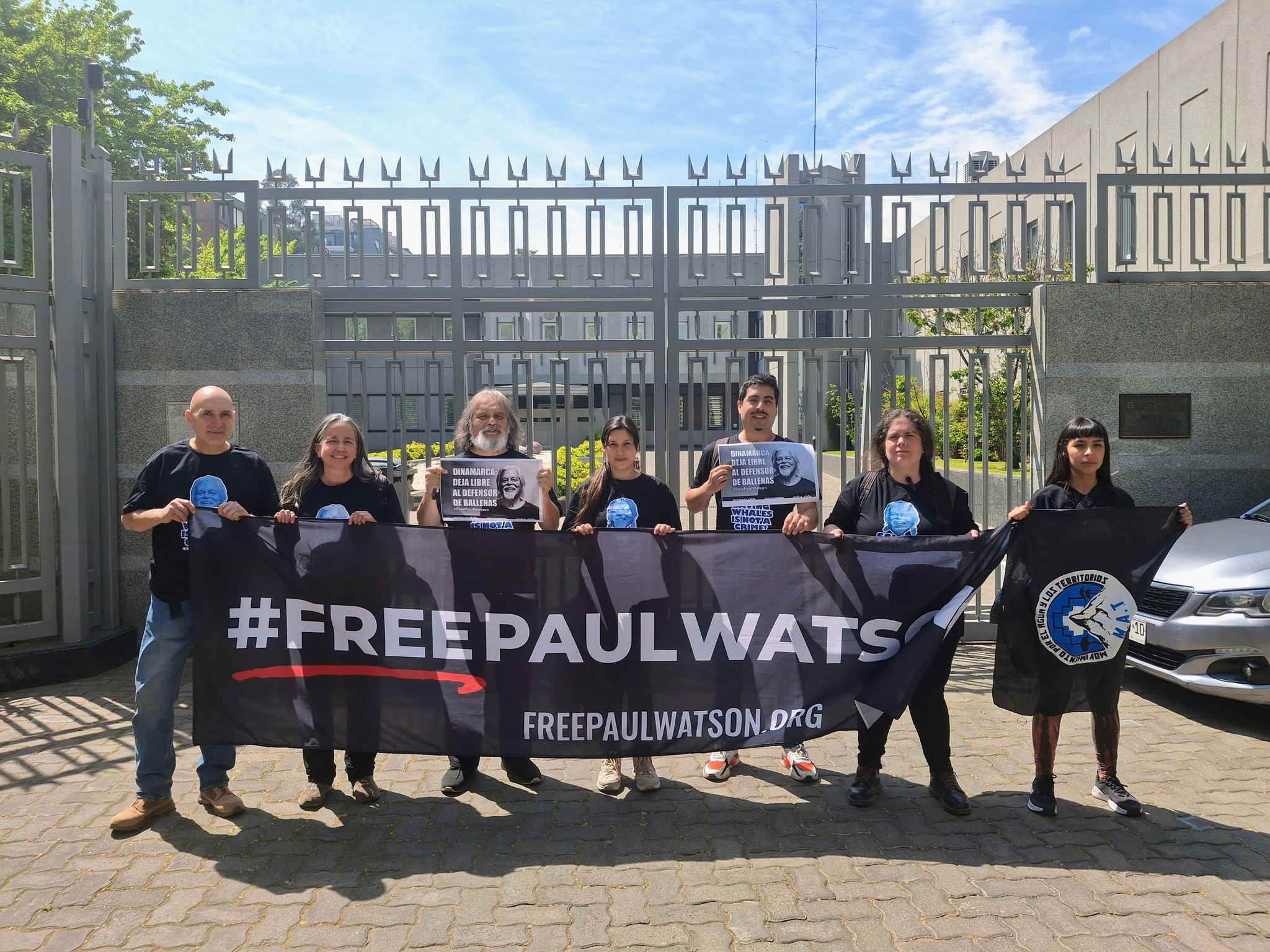Santiago de Chile, October 3, 2024 – Environmental organizations gathered in front of the Japanese Embassy in Santiago, Chile, to demand the release of Canadian/American activist Paul Watson, who is currently detained in Greenland awaiting a decision from Danish authorities on Japan’s extradition request.
Watson, 73, former director of Sea Shepherd and founder of the Captain Paul Watson Foundation, has been in custody since his arrest in late July in Nuuk, the capital of Greenland. His vessel, the John DeJoria, had stopped to refuel before continuing its mission to intercept Japan’s new whaling factory ship, Kangei Maru, which has been hunting fin whales since July.
The arrest warrant issued by Japanese authorities dates back to 2012 and alleges that Sea Shepherd’s fleet caused damage to a whaling ship and supposedly injured a Japanese crew member in 2010 during the so-called “scientific” whaling operations of Japan in the Southern Ocean Whale Sanctuary .
According to Elsa Cabrera, Executive Director of the Cetacea Conservation Center (CCC), “It is the Japanese government and all those responsible for conducting the ‘scientific’ whaling program for over 30 years in Antarctica who should be the ones behind bars. Remember that in 2014, the International Court of Justice, the highest judicial body in the world, ruled that these whaling operations were illegal. This means that Japanese authorities killed tens of thousands of whales illegally in a whale sanctuary established under international law.”
“It is ironic that today we find ourselves in front of that country’s embassy, demanding the release of someone who was seeking to uphold international environmental law,” Cabrera emphasized.
On October 2, the Greenlandic court was expected to decide on Japan’s extradition request, but instead chose to extend Watson’s detention for another three weeks. Watson’s lawyer, Julie Stage, stated that the court’s decision was not surprising, confirming that they have requested a review of the legality of the detention before the Supreme Court of Denmark.
Francisca Fernández Droguet, a member of the Movement for Water and Territories (MAT), asserted that they are part of this national and international action for the liberation of Paul Watson because he “is a defender of whales and oceans who has managed to shed light on the horrors of extractive practices that continue to be perpetuated by Japan.”
Furthermore, “we seek to highlight his current prison situation. Today we can say that Paul Watson is a political prisoner because he is being detained for defending and advocating for the ocean and whales. That is the primary reason for his imprisonment, under a pretext of preventive detention that they want to prolong in order to silence him.”
It should not be forgotten that “Japan is one of the main countries that has sabotaged any type of whale protection policy to continue profiting and maintaining privileges at the expense of slaughtering these beings. As MAT, we find it absolutely vital to demand the freedom of Paul Watson in the context of a continuous criminalization and persecution of defenders of land, territories, and waters,” Fernández emphasized.
So far, the Danish judicial system has been characterized by its independence, fairness, and protection of individuals’ rights. However, it seems that Japan’s influence in this case is rapidly undermining these principles. Reports indicate that Watson’s conditions in Greenland are concerning.
In this regard, Juan Carlos Cárdenas, Director of Ecoceanos, stated, “Paul Watson has been arbitrarily deprived of his liberty for 74 days in Nuuk’s prison, and to make matters worse, the Danish prison authorities have recently prohibited access to the medications he needs for his diabetes and hypertension treatment, violating the most basic standards of humanity and respect for human rights.”
The call is “to citizens and environmental movements to increase their support for the international campaign to free Captain Paul Watson, and to prevent Peter Hummmelgaard, the Danish Minister of Justice, from attempting to extradite him to Japan once public attention and international pressure have diminished.”
The organizations urged Danish authorities to make an urgent decision to free Paul Watson and protect him from the potential inhumane treatment that characterizes the Japanese penitentiary system, as reported by Human Rights Watch in 2023.
Support for Watson and outrage at Japan’s persecution of those who expose the environmental crimes of the industrial whaling fleet continues to grow. “The credibility of the Danish justice system depends on how it resolves this case,” representatives from OLCA, Ecoceanos, CCC, and the Movement for Water and Territories declared.
For more information:
Isabel Diaz Medina
Journalist
+56 9 54024239



